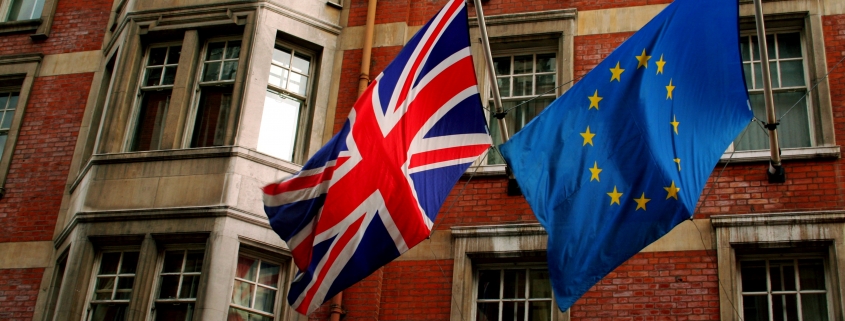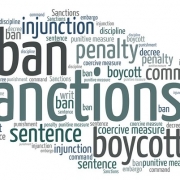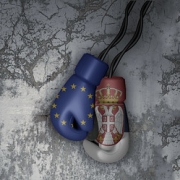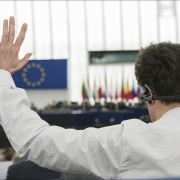Within the bosom of the European Union, the shift from the European idealism to the Euroscepticism is already a reality. In the UK, this phenomenon has gradually grown within the last three decades as opposed to deeper integration that could threaten British sovereignty (Daddow, 2006).
But what exactly is the phenomenon of Euroscepticism and how does it relate to the UK’s referendum? In the literature, the definition is very ambiguous. Certainly, it represents the voice of those who oppose to further integration that lacks legitimation, but their views vary over the constitutional design for the EU, from intergovernmental to alternative paths of integration with the first option being closer to the UK’s views.
The negative perspective of Britons for the European Union lies in the British history which links back in the 19th century, the era of nationalism in the UK that drew the line between continental Europe and the island (Daddow, 2006). Also, the press held a leading role for nurturing and amplifying an anti-European culture in the UK.
In the most recent history of the UK politics, Euroscepticism reached its peak with the Prime Minister of the Conservative party, Mr David Cameron asking for a referendum in his 2013 EU speech if reelected in the UK general elections of May 2015. Early this month and after a two-day summit in Brussels, he successfully renegotiated with his counterparts the terms of UK’s membership. Now, the say is on the British people who are called to vote with an in/out referendum on 23rd of June 2016.
Why Britain is asking for a referendum now?
To answer this question, it is essential first to understand where Europe currently stands. Second, to address the challenges that threaten European integrity. An accurate overview is given in Rayman & Bremmer’s article, where Europe is represented as a bad formula of countries with “a strong Germany, weak France and absent Britain’’ that restrain the EU from its growth and unity (Rayman and Bremmer, 2015). In addition, the European Union is coping with a Eurozone crisis, a lack of competitiveness in its domestic market in conjunction with political instabilities and the entrance of massive migrant and refugee numbers.
Same reasons were also presented in Cameron’s speech as a justification for the referendum signifying the irrelevance that the UK feels against the EU. Nevertheless, the main objectives of the British negotiations were to protect the country from further political and economic integration and to strengthen the role of the state in the decision-making process within the EU. This is why Cameron suggested a new formula for the EU that will incorporate a flexible network of countries with different levels of integration and cooperation.
In broad terms, the British prime minister has managed to reach a consensus with the European partners in relation to the UK’s claims with some adjustments: a) safeguard the British economy from the Eurozone crisis and the financial centre of City from excessive regulations, b) exclusion of the UK from further integrations, c) reinforcement of the national parliaments’ power to block unwanted legislation, d) refusal in certain migrant benefits such as childcare and migrant welfare payments.
Of course, the negotiations were held within a climate of mutual concessions and disagreements from both sides. Α typical example was the support of the German Chancellor over the cut benefits for the EU nationals that migrate in the UK for the first four years, but characteristically rejected any chance of renegotiating the “fundamental achievements of European integration” (Euractiv.com with AFP, 2016). On the same wavelength, the Hungarian Prime Minister, Viktor Orban, agreed on the basis of further EU reforms but opposed to the UK’s practice to stop the social benefits for the EU nationals, since many Hungarians work and live in the UK.
At the same time, Cameron’s proposals get mixed reception not only in Europe but in the UK as well. Some voices within the UK criticized the failure of the new agreement to address the immigration problem or the inability to control Brussels overpower to UK politics. Moreover, his party integrity is already under risk with Conservative MPs divided between the “in and out” options, while the British public appears fairly evenly divided according to the latest opinion polls (BBC News, 2016a).
In the aftermath, one can assume that the real motive behind Cameron’s decision to call a referendum was to pacify the Eurosceptic voices within his country. And this could be attained by renegotiating the terms of the UK’s membership and by obtaining specific exceptions favourable for the UK.
The exit scenario: what if Britons vote “no” in June’s 2016 referendum
Let’s assume that Britons choose to exit the European Union in June’s 2016 referendum. In this case, the European law provides the right for a member state to leave the European Union. According to article 50 of the Treaty of the E.U, a country needs to notify the European Council for its decision to withdraw. Then, negotiations will follow regarding the terms of exit and the future status of the member state with the Union (Treaty of Lisbon, 2009). The Treaties shall cease to apply in the country once the agreement has been reached for the withdrawal or failing that, within two years after the notification.
Some interesting insights can be drawn here. First, the UK will have the right to disengage from the EU treaties automatically following the expiry of two years, but this approach will prevent it from securing a post-exit relationship. However, its negotiating power will be amplified, as there will be no interest in satisfying the EU demands. Second, the settlement of a post-exit relationship will be one of the bargaining chips for the EU as this special status could vary from “a free trade arrangement to membership of the European Economic Area or to a new higher form of privileged partnership with the EU” (Nicolaides, 2013).
Yet, with a post-exit agreement or without, the hypothetical withdrawal entails some complexities. The exit procedure will be long and painful with possible disputes from both sides. The UK will be forced to fill in the gaps of the European law or the international agreements (where the EU was the signatory party) with extensive re-legislation. In financial terms, the domestic economy in the UK will meet some difficulties with no more access to a free market and to one of the largest networks of trade agreements in the world, which might also hurt its credibility in the financial market.
Conclusions: Europe needs the UK and vice versa
All these Eurosceptic voices across Europe made it clear to Brussels that reforms need to be made. The rise of the Eurosceptic view is a vital part for the EU democratisation and its examination could help policymakers to extract valuable answers to the questions regarding the sovereignty problems of the EU.
Assuming the UK represents a sceptical country that seeks a different status of membership within the EU, Europe should respect this choice. A European model that incorporates countries with different levels of integration could pave the way to further political integration. The history of the European Union teaches us that economic cooperation and integration evolved by allowing countries to join the European Community or to seek a special economic partnership with the EU, including Norway or Iceland (both part of the European Economic Area -EEA) or Switzerland (a member of the European Free Trade Area -EFTA).
What is clearly understood is that Europe needs the UK and the UK needs Europe. A UK exit equals to a weaker European Union, while for the UK, a future outside the EU will mean no access in the EU decision-making let alone the economic consequences.
Photo: Dave Kellam, Flagging Support (2007). Source: (flickr.com) | (CC BY-SA 2.0)
Bibliography
Bahadir A., Micco P. and Fayos F.G. (2015) The European Economic Area (EEA), Switzerland and the North, European Parliament, Available at: http://www.europarl.europa.eu/atyourservice/en/displayFtu.html?ftuId=FTU_6.5.3.html (Accessed 22nd February 2016)
BBC News (20/02/2016a) EU referendum: Cameron sets June date for UK vote, Available at: http://www.bbc.co.uk/news/uk-politics-35621079 (Accessed 22nd February 2016)
BBC News (20/02/2016b) The UK’s EU referendum: All you need to know, Available at: http://www.bbc.co.uk/news/uk-politics-32810887 (Accessed 22nd February 2016)
Daddow J. O. (2006) Euroscepticism and the Culture of the Discipline of History, Review of International Studies, 32 (2): 309-328, Cambridge University Press, Available at: http://www.jstor.org/stable/40072140 (Accessed 23th March 2015)
Dave Kellam (2007) Flagging Support, Flickr.com (CC BY-SA 2.0), Available at: https://www.flickr.com/photos/davekellam/414918350 (Accessed 25 January 2016)
Euractiv.com with AFP (2016) Cameron Brexit proposals get mixed reception in Berlin and Budapest, Euractiv.com, 7th January 2016, Available at: http://www.euractiv.com/sections/uk-europe/cameron-brexit-proposals-get-mixed-reception-berlin-and-budapest-320783 (Accessed 27th January 2016)
Mark Briggs (2015) As it happened: The UK election, Euractiv.com, 7th May, Available at: http://www.euractiv.com/section/uk-europe/news/as-it-happened-the-uk-election/ (Accessed 22 February 2016)
Nicolaides P. (2013) Is Withdrawal from the European Union a Manageable Option? A Review of Economic and Legal Complexities, Bruges European Economic Policy Briefings, College of Europe, Available at: https://www.coleurope.eu/sites/default/files/research-paper/beep28_0.pdf (Accessed 21st February 2016)
Official Journal of the European Union (2008) Consolidated Version of the Treaty on European Union and The Treaty on the Functioning of the European Union (2008/C 115/01, European Union, Available at: http://eur-lex.europa.eu/legal-content/EN/TXT/PDF/?uri=OJ:C:2008:115:FULL&from=EN (Accessed 21st February 2016)
Rayman N. and Bremmer I. (2015) Europe’s Rough Ride, Time, 185 (4): 8-9, Available at: https://www.ebscohost.com (Accessed 23rd March 2015)
The Telegraph (23/01/2013) David Cameron’s EU speech in full, Available at: http://www.telegraph.co.uk/news/worldnews/europe/eu/9820230/David-Camerons-EU-speech-in-full.html (Accessed 21st February 2016)
Wilde P. and Trenz H.J. (2012) Denouncing European integration: Euroscepticism as polity contestation, European Journal of Social Theory, 15 (4): 537-554, Available at: http://est.sagepub.com (Accessed 23rd March 2015)





 176th Wing Alaska Air National Guard's photostream
176th Wing Alaska Air National Guard's photostream 




Leave a Reply
Want to join the discussion?Feel free to contribute!